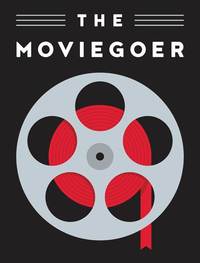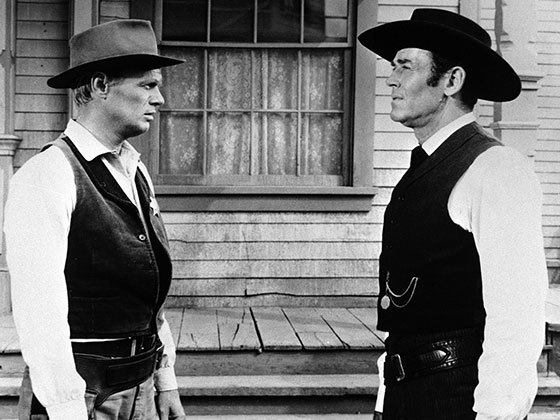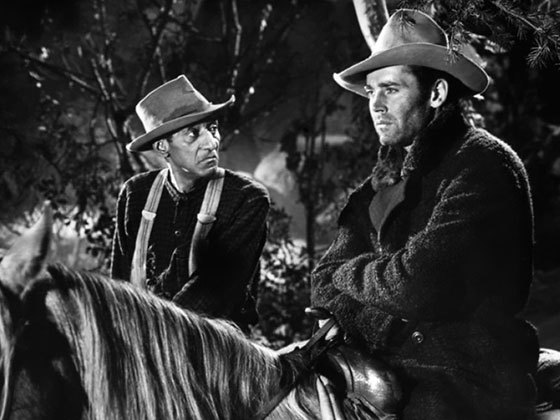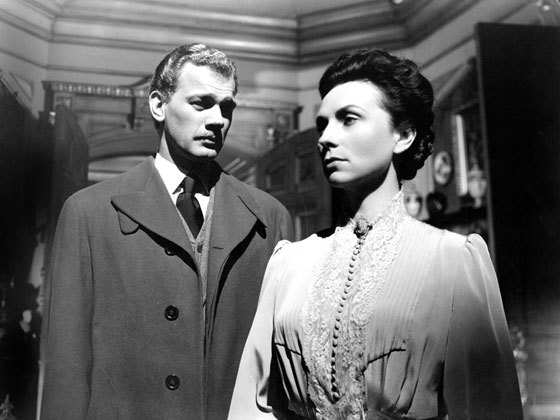By Jonathan Rosenbaum
At once rigorous and creative, James Schamus’s faithful yet broadening adaptation of a late Philip Roth novel offers exemplary acting and direction.
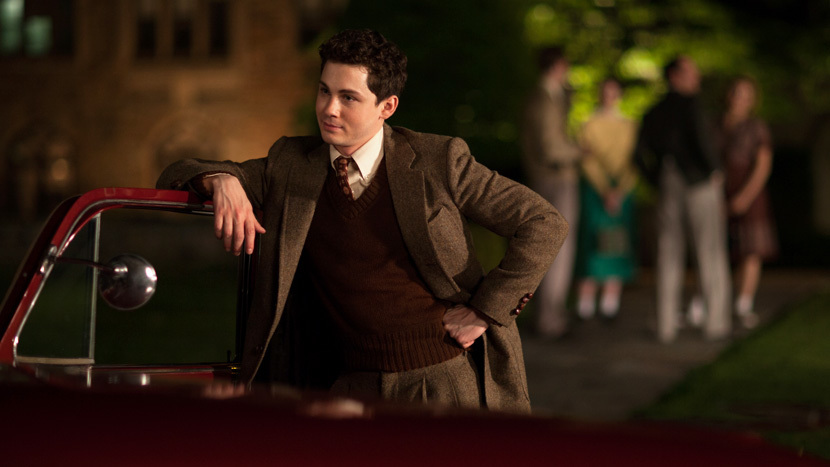
No fewer than seven features to date have been based on works by Philip Roth, and three of these have been directed by first-timers, all of whom previously made their cinematic mark in other professional capacities. Ernest Lehman (1915–2005) had a long and distinguished screenwriting career before directing his own adaptation of Portnoy’s Complaint in 1972, and Ewan McGregor acted in over four dozen features before directing American Pastoral forty-four years later. James Schamus, a film professor at Columbia University, had over fifty producing credits—plus writing and producing credits on all but three of Ang Lee’s features—before he added direction to his producing and writing on Indignation. This has yielded what Stephen Holden in The New York Times has called “easily the best film made of a Roth novel, which is saying a lot.”
Schamus’s dexterity in navigating both commercial film production and academia has served him well on this project, enabling him to honor his source while rendering it both accessible and personal. Even though the film’s action unfolds during the Korean War (1950–53) and Schamus wasn’t born until 1959, his handling of period is as nimble and evocative as his grasp of Jewish American speech patterns, and he combines this sensitivity with certain elements and inflections that make the film seem contemporary as well. Part of what gave the book currency when it came out in 2008 was the Pentagon’s ban on photographing the homecomings and burials of dead American soldiers shipped back from Iraq and Afghanistan. What makes Schamus’s 2016 version of the story seem contemporary is more subtle (spoilers ahead), and much of it has to do with the handling of the story’s young heroine, Olivia Hutton (Sarah Gadon).
| READ THE NOVEL |
 |
| in Philip Roth: Nemeses |
The thread that connects Indignation with Schamus’s collaborations with Ang Lee is sexual repression—a major concern in The Ice Storm, Brokeback Mountain, and the appropriately titled Lust, Caution. Significantly, the story’s main setting is a rural college in Ohio known as Winesburg—an allusion to Sherwood Anderson’s 1919 story collection Winesburg, Ohio, where sexual repression is a major preoccupation. Roth’s short novel belongs to a doom-ridden quartet of novels concerned with death and the fragility of the human body (potently centered here in the figure of a vulnerable college sophomore), entitled Nemeses and consisting of Everyman (2006), Indignation (2008), The Humbling (2009—itself the source of a 2014 feature), and Nemesis (2010), published together in a single volume by Library of America.
Marcus Messner (Logan Lerman), the only child of a kosher butcher in Newark, a virginal straight-A student who sometimes works as his father’s assistant, transfers to Winesburg during his sophomore year in order to escape the neurotic worries and excessive attentions of his father—a move that corresponds closely to Roth’s own transfer to Bucknell University in Pennsylvania from Rutgers in 1951. Acutely aware of both the sacrifices made by his parents (neither of whom went to college) for his education and the loss of many cousins during World War II and some friends in Korea, Marcus wants at all costs to evade the draft. One aspect of the novel strikingly conveyed in the film is the shocking relation between Marcus’s experiences in a butcher shop and the fatal butchery he perceives and ultimately suffers in Korea: “I envisioned my father’s knives and cleavers whenever I read about the bayonet combat against the Chinese in Korea. I knew how murderously sharp sharp could be. And I knew what blood looked like, encrusted around the necks of chickens where they had been ritually slaughtered, dripping out of the beef onto my hands when I was cutting a rib steak along the bone, seeping through the brown paper bags despite the wax paper wrappings within, settling into the grooves crosshatched into the chopping block by the force of the cleaver crashing down.”
After Marcus falls in love with Olivia, another transfer student and a troubled non-Jew, the fact that she once attempted suicide by slitting one wrist becomes another cross-reference to his background in butchery: “Had she been successful,” he reflects, somewhat callowly, in the novel, “had she expertly completed the job with a single perfect slice of the blade, she would have rendered herself kosher in accordance with rabbinical law.”
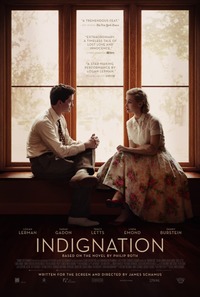
It’s one limitation of the novel’s first-person narration that our sense of the other characters, Olivia in particular, is restricted to Marcus’s naïve and immature perceptions of them. Significantly, even Roth’s sympathetic biographer and friend Claudia Roth Pierpont regards Marcus’s subjectivity in the novel as a drawback: “[Marcus] is a wholly believable figure and, in his desperately proud and confused youth, rather heartbreaking (without ever being sentimentalized). The characters around him, though, are less credible: their motivations are obscure, and none seem designed to do much more than advance the story.” Schamus minimizes this drawback by employing the narration only half a dozen times, and meanwhile complicates its function by adding separate voiceovers of Marcus and Olivia reading their letters to one another (and by illustrating Olivia’s voiceover with brief shots that can be read either as objective flashbacks or as Marcus’s subjective responses to her letter). As a result, promiscuous Olivia, for example, becomes more aggressive in the movie. In both book and film, she gives Marcus a blow-job on their first date and later masturbates him in the hospital more than once after his appendectomy. Roth’s Marcus discreetly prompts her, but Schamus’s Olivia makes the first moves. Yet, to borrow Pierpont’s phrase, the movie still, like the book, “moves forward like a missile on a carefully plotted trajectory.”
Marcus dies a virgin—according to his Newark pals, a fate even worse than simple death—and indeed, as in Ambrose Bierce’s grim Civil War story “An Occurrence at Owl Creek Bridge,” the entirety of the hero’s story as he remembers it turns out to be a feverish deathbed recollection. And even though his narration persuades us to share some of his scorn for both his father’s fears and the concerns of Dean Caudwell (Tracy Letts) about his isolation, both Roth and Schamus give these adult viewpoints a certain amount of credence. Marcus’s father’s supposedly irrational fears for his son turn out to be well-founded, and Marcus meets Caudwell’s nosy (if compassionate) concerns about his isolation as well as his narrow-minded dismissals of Bertrand Russell with the rants of a self-righteous prig.
Some of Schamus’s changes as an adaptor are expedient simplifications of the material, such as Marcus changing his dorm room once rather than twice after clashes with his roommates (although this makes the Dean’s worries in the film about a single room change more excessive), or having him work at the university library rather than as a taproom waiter. But other alterations yield significant if delicate differences in interpretation. Most of the novella is a lengthy chapter called “Under Morphine” narrated by Marcus (and followed by a very brief third-person chapter, “Out from Under”), yet, as previously noted, the movie’s use of Marcus’s first-person narration is quite sparing.
Schamus does his most incisive and resonant re-imagining with Olivia. In an interview, he has mentioned modeling her on Sylvia Plath. He begins and ends the film in the present, over half a century later, with a glimpse of Olivia in a sanitarium, framed against a wallpaper design of flowers that visually rhymes with the bouquet she brings to Marcus in the hospital. He also names the present-day Olivia “Mrs. Anderson,” which informs us that, after her involvement with Marcus, she married someone else.
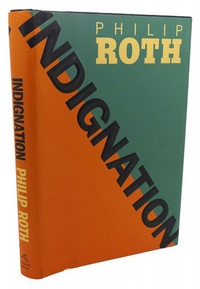
Schamus completely omits two of the novel’s climaxes—Marcus’s discovery of the trashing of his dorm room by his former roommate Flusser, and a massive student riot that begins as a snowball fight and panty raid, and ends in several expulsions. Both these events relate to sexual repression (in the case of Flusser, his homosexual attraction to Marcus, which the film only hints at). Even though a conventional reading of the student riot as “cinematic” would appear to have made it obligatory, Schamus’s exclusion of this episode implies that he rightly regarded it as both thematically redundant and a distraction to the story he wants to tell (Marcus is not even a participant). Far more important to him are Marcus’s conversations with Dean Caudwell, the first of which he allows to run for over seventeen minutes, and this scene, delivered almost intact from the novel, is clearly the film’s centerpiece.
Part of what makes this sequence a tour de force is the care with which Schamus calibrates its separate stages of rising tension on Marcus’s part without ever overloading one’s sympathies simply or unequivocally on either side of the discussion. What for Roth and the actors (Lerman and Letts) qualifies as a triumph of dramatic equipoise becomes for Schamus a triumph of mise-en-scène as the dialogue passes from his change of dorm rooms after a conflict with his roommates to his avoidance of any ethnic identification on his college application (listing his father’s profession as “butcher” but not “kosher butcher”) to his relationship to his parents to his dating to his resentment of being obliged to attend chapel, his proud atheism, and his reverence for Bertrand Russell’s Why I Am Not a Christian, and finally to baseball before he collapses from an attack of acute appendicitis.
Although most of this sequence’s power clearly comes from Roth, Schamus contrives to make it his own by preparing for it in numerous ways, thematically as well as dramatically. Ten minutes into the film, when we see Marcus reading after a day’s work at Messner’s Meat & Poultry, it’s a pamphlet by Bertrand Russell pointedly called Stoicism and Mental Health. He also invents an entire dialogue in the hospital between Marcus, his mother (beautifully played by Linda Emond), and Olivia about her parents, the courses in American history and culture that Marcus is taking, and Olivia’s citation of a definition of democracy attributed to Benjamin Franklin: “two wolves and a lamb voting on what to have for lunch.” If we emerge from this film less than certain about which characters qualify as wolves and which qualify as lambs, Roth and Schamus seem jointly responsible.
Roth’s one-word title derives from a line in the English translation of the Chinese national anthem, which Marcus learns in grade school during World War II, when China was a U.S. ally. It’s an anthem he defiantly recites to himself while attending compulsory chapel against his will (not as a Jew, but as an atheist), when China has become the ally of a U.S. enemy in Korea. (None of this anthem figures in the film, undoubtedly because it would have been too cumbersome to explain and illustrate.) If all this sounds somewhat remote to American experience in 2017, we should recall that even though American soldiers today aren’t drafted to fight in overseas wars, the indifference of their compatriots to these soldiers’ deaths or dismemberments appears to be just as pronounced. Which is only to suggest that, even though many of us are more enlightened today about freedom of religion and (say) gender equality than we might have been in 1950, we still have our own set of everyday ideological blinders to contend with.
Video: 2016 trailer for Indignation (2:17)
Indignation (2016). Directed and written by James Schamus, based on Philip Roth’s novel. With Logan Lerman, Sarah Gadon, Tracy Letts, Linda Emond, Danny Burstein, and Ben Rosenfield.
Buy the DVD • Buy the Blu Ray • Watch on Amazon Video • Watch on Fandango Now • Watch on Google Play • Watch on iTunes • Watch on Vudu
Jonathan Rosenbaum, former film critic of the Chicago Reader, maintains a web site archiving most of his work at jonathanrosenbaum.net. His most recent book is Goodbye Cinema, Hello Cinephilia: Film Culture in Transition.
The Moviegoer showcases leading writers revisiting memorable films to watch or watch again, all inspired by classic works of American literature.
